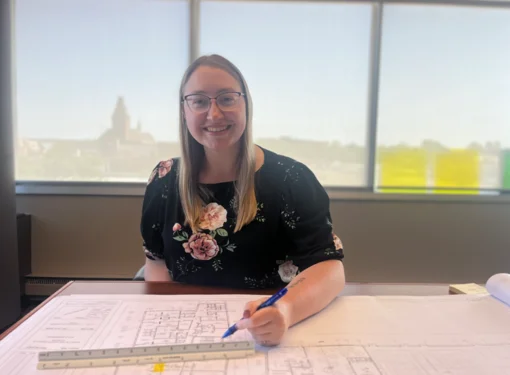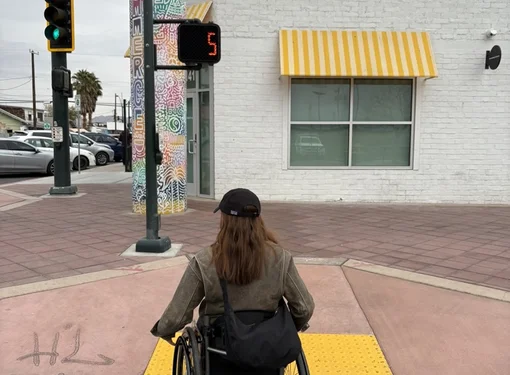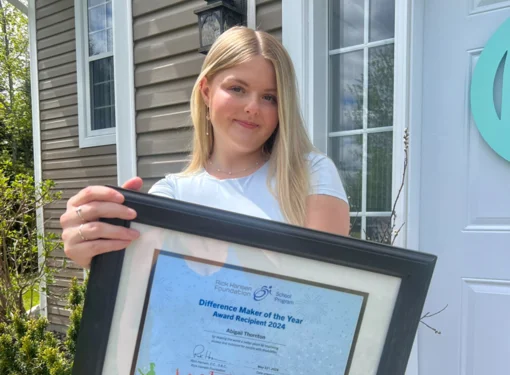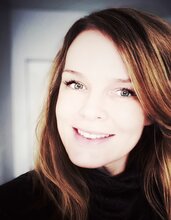From Courts to Causes: Introducing RHFSP’s Team Members
This is a story about two athletes, each from different backgrounds and pursuing different sports. Despite their separate journeys in athletics, destiny led them not as opponents on the courts but as teammates in the offices of the Rick Hansen Foundation.
Anne-Marie Dolinar is a nationally ranked wheelchair tennis player with her most recent triumph including a sweep of the podium at the 2022 Birmingham National Wheelchair Tennis Championships where she clinched both singles and doubles titles on the courts in Montreal, Quebec last November.
Teri Thorson recently made headlines as assistant coach of Canada’s inaugural Women’s Cup Wheelchair Rugby team that secured a bronze medal at the 2023 Women’s Cup in Paris, France in March. This achievement is another addition to Teri’s long list that encompasses her past as model and dancer, Paralympian achievements, role as fashion designer, mother, and speaker.
As colleagues in the Rick Hansen Foundation School Program (RHFSP), Anne-Marie and Teri took a moment to have a conversation with RHF writer Rebecca Blissett about their respective sports and the influence these pursuits have had on the course of their lives.
Anne-Marie Dolinar
Tennis has always held a special place in Anne-Marie’s heart. She was “obsessed” with American tennis legend Serena Williams, the unparalleled player who achieved a career Golden Slam in both singles and doubles tennis. While Anne-Marie played recreationally at her local courts in Ontario while growing up, it wasn’t until she sustained a spinal cord injury in her twenties that she elevated her game to a competitive level.
“I just loved it from the get-go,” she said. “I started playing as soon as I could post-surgery. I couldn’t wait to get on the court. Wheelchair tennis provided me with a sense of freedom of movement.”
Anne-Marie’s physiotherapist encouraged her to explore various sports, a recommendation grounded in solid reasoning. Engaging in sports has numerous physical benefits such as increasing muscle strength and stamina. It also improves quality of life, contributing to overall mental well-being.

For Anne-Marie, wheelchair tennis became her passion. Unlike other activities, such as cross-country skiing, adaptive tennis mirrors its able-bodied counterpart. The same court, net height, racket and balls are used with the only difference being that wheelchair tennis allows for two bounces of the ball instead of one.
Anne-Marie wheeled onto the court for the first time in August 2017. By the fall of 2018, she was already competing at a national level. Just a year later, she clinched gold in the women’s singles at nationals. Impressively, Anne-Marie was selected to represent Canada at the 2023 Parapan American Games in Chile this November. This selection marks the first time she’ll be competing in a multi-sport games.
Anne-Marie said. “This year, I started working with a sports psychologist because, once you reach a certain level, it’s impossible not to have additional tools in your toolbox. So, it’s helping me a lot with handling pressure in the moment. In a match, I just take it one point at a time.
For those interested in participating in adaptive sports, Anne-Marie recommended reaching out to local or provincial clubs that cater to their chosen sport. She also emphasizes the supportive and interconnected nature of the disability community, where people with disabilities are a great resource.
“Even amongst each other, there’s always good connections to be made,” said Anne-Marie. “Fellow people with disabilities can always point you in the right direction.”
Teri Thorson
Teri never quite saw herself as an athlete in her formative years. Although she was open to playing sports and played on a soccer team for a few seasons, even trying venturing into the world of track, it all came to a halt after a discouraging experience at her first athletics competition. A misstep over a hurdle left her so disheartened that she vowed to never compete again. She made good on her promise to herself, she hasn’t owned a pair of running shoes since.
But that was then, and this is now. Like Anne-Marie, Teri was encouraged to try sports after sustaining a spinal cord injury in a car accident. Surprisingly, she found herself back on the track; in 2004 she was a finalist in the 400-metre wheelchair race at the Paralympic Games in Athens, Greece.
“Sports made me much more independent and confident and fit and healthy. It really changed my life,” Teri said. “It also brought a sense of community. I have all these things in common with other people I’ve met through sport and they just happen to be people in wheelchairs as well. But what’s funny is that even after the experience of going to the Paralympics, I still would never have called myself an athlete. I had this weird mentality from when I was a kid, when I just hated sports. And because I no longer hated what I was doing I thought, well I can’t be an athlete because I love it.”

Following her retirement from racing, Teri fell in love with wheelchair rugby, further shattering her notion about her identity as a non-athlete. Not only did she compete in the full-contact, fast-paced, and aggressive sport (there’s a good reason it initially was called Murderball by the Canadians who pioneered it), she started supporting other athletes through coaching. Teri was behind the bench for the Canadian women’s team as they made their debut at the Women’s Cup in Paris, France, culminating in a bronze medal this past March.
The Women’s Cup, hosted by the French Wheelchair Rugby Federation, featured national teams from Britain, and Canada, and mixed teams made up of individual players from all over the world. After losing the first two matches, including a blow-out to eventual champions Britain, the Canadians rallied to win every subsequent game including the final against Team One point, one of the mixed teams. Canadian players Melanie Labelle, Erika Schmutz, and Julia Hanes received MVP honours.

With her extensive involvement in athletics, which includes serving on the board for BC Wheelchair Sports Association and the BC Wheelchair Rugby Association, Teri has finally embraced the identity of being an athlete.
“Yeah, I do call myself an athlete now. And I have realized that I am actually very, very competitive,” she said. “I’m also really passionate about developing women’s involvement in sport. I am so happy to have found this world.”







